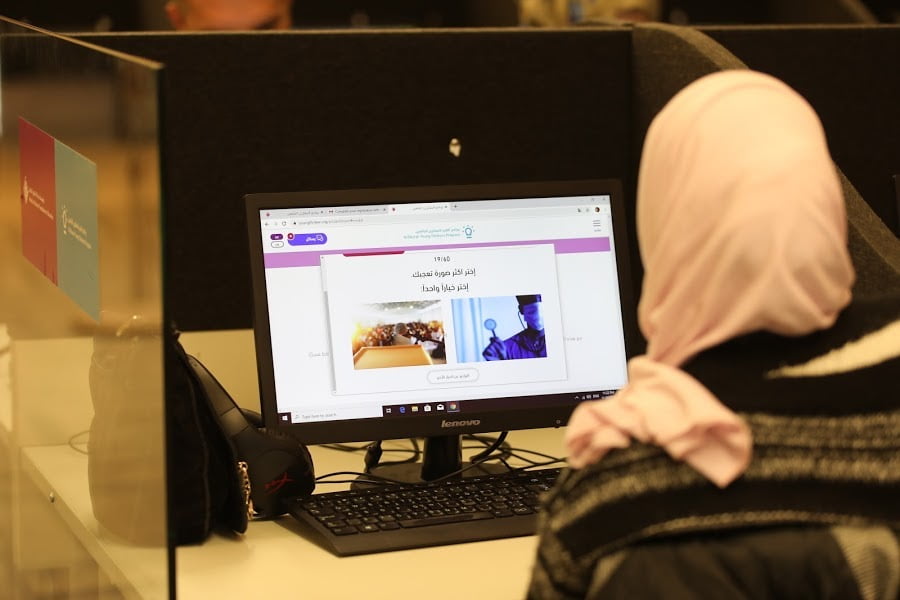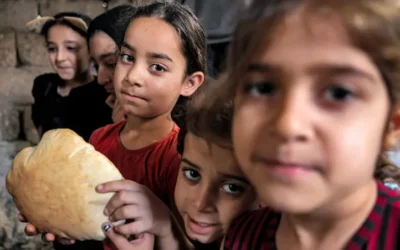Abdulla Al Ghurair STEM Program – SDG Good Practices
Intro
The Abdulla Al Ghurair Foundation for Education (AGFE) launched the Al Ghurair STEM Scholars Program (AGSSP) in 2015 to provide high achieving underserved Arab youth with access to relevant and high-quality higher education opportunities. In addition to receiving full tuition coverage, transportation, and living allowances, scholars are provided with comprehensive career readiness support including the AGFE Mentorship Program and internship support. Through these experiences, scholars enhance their soft skills, leadership, and inter-personal skills. They also start to expand their professional network.
Description
Higher education graduates in the Arab world often find themselves unqualified or unable to succeed in the labor market. There is a lack of career guidance and education-employment sector linkages that leave Arab youth unprepared for livelihood decision. Among other factors, this lack of university and career preparation contributes to a disturbing unemployment rate of Arab youth, with university graduates who make up nearly 30% of the total number of unemployed in the region. Through the career readiness support component of the AGSSP, Scholars are equipped with the skills and experience to secure relevant job opportunities. In particular, the Mentorship Program bridges skill gaps by exposing mentees to mentors’ experiences from their career trajectory. Its main objective is to provide mentees with confidential, non-judgmental, and constructive support to enable them to develop their employability, job readiness and career exploration capabilities.
Contribution to SDG Implementation
In line with Sustainable Development Goal 4, the AGSSP provides high achieving underserved Arab youth with access to quality higher education opportunities. Through its comprehensive career readiness support, especially the Mentorship Program, AGSSP also contributes to the realization of Sustainable Development Goal 8. The Program has been designed to equip scholars with the knowledge, skills and experience to secure jobs in order to support themselves and make valuable contributions to their communities.
Implementation methodologies
The implementation of the Mentorship Program follows a rigorous process throughout the planning to execution phase. Program planning takes one month ahead of the start date of the new cycle: o Final documents, such as the mentorship guides and the questionnaires, and email templates are prepped (1 week). o An outreach plan, including the invitation lists of entities and individuals is prepared o A call is made to mentors (through program administrator) and mentees (through their UCs) to sign up and take part in the program over the next 2-3 weeks. o Once registration closes, the AGFE administrator matches mentor and mentees over the next week and sends out matching emails to all. Since this is a mentee-driven program, the mentee sends out the introductory email to his/her mentor over the 2-week period. The scholar careers team monitors the progress of all mentees and kick off the program. Next steps in the process are: o A midpoint check in email is sent out to make sure things are running smoothly and everyone is still engaged. o A ‘one month left’ email is sent out to start rolling out the Program, divided into three main phases: Foundation (1 month), Progress (2 months), and Analysis/Revision (1 month). o A ‘one week left’ email is sent out to close off for all o A survey is sent out at the end to assess the outcome and impact. Mentors and mentees are given 3 weeks to complete o A certificate of appreciation is sent to all mentors after the survey deadline o Over the next 2 weeks, a feedback review is undertaken and a survey results document is produced o Based on the results, over another week the mentorship documents are modified and improved for the next round
Results
The AGSSP has supported 648 scholars from 17 Arab states: 47% are female, 10% refugees, while 39% are the first in their families to pursue higher education. Thanks to the Program’s comprehensive career readiness support, 84% of the scholars who graduated before the Covid crisis went on to secure jobs with renowned companies such as Procter and Gamble or UNESCO or sought competitive higher education opportunities including top universities in the region (American University of Beirut) and abroad (McGill) after program completion. Throughout their education, scholars have participated in 358 internships and 24 workshops/webinars with industry leaders including Unilever and Oracle to enhance career readiness only in 2020. As for the Mentorship Program, over three rounds of the program, it has shown great success. Mentee numbers increased by 126%, while the number of mentors from a wide range of backgrounds almost tripled. According to a 2020 survey conducted with 189 mentees and mentors, mentees reported: 64% had met their goals; the program helped frame their developmental goals (24%), expand their networks (21%) and strengthen their CV/cover letter (21%). Mentors reported that they became more exposed to another generation’s interests, and enhanced their leadership and interpersonal skills.
Enabling conditions to support the STEM Program’s mentorship program: 1. Enhanced partnerships and willingness of professionals to give back 2. Virtual webinars made logistics easier 3. Accurate mentor/mentee matching based on a detailed questionnaire 4. Mentee-driven approach: mentees took initiatives to grow the mentorship relationship Constraints: 1. Getting mentees to email their mentor 2. Commitment level of mentees Overcoming the constraints: 1. Program administrators support mentees for the first few emails with the mentor 2. Program administrators check in mid-way through the program 3. Mentors commit to the program in writing
Regarding sustainability, mentees enhance their network and job-seeking potential with the help of mentors. As part of the Mentorship Program, mentees can automatically add one new person to their network, i.e. the mentor. Mentors have connected mentees to new people to grow and expand their network. In terms of replication opportunities, the career readiness toolkit has been developed to offer scholars access to resources to support career advancement. The toolkit comprises a set of documents and tools gathered as a result of lessons learned from the AGFE education-to-employment practices and Mentorship Program cycles. Beneficiaries across our programs and beyond can benefit from the toolkit which includes: two samples of CV formats, 10+ essential resources including CV and cover letter writing tips, preparing for interviews and guidelines to writing a professional email.
Covid-19 has negatively impacted the STEM program’s career readiness support in two ways: 1. Less internship opportunities and available jobs for graduates in a very tough job market 2020 2. It took time for companies in the region to embrace the remote internship model Shifting to virtual mentoring due to Covid also had its benefits: 1. Much easier to match mentees and mentors residing in different countries 2. Face-to-face meetings weren’t essential anymore to achieve program success.
Feature By: Department of Economic and Social Affairs – Sustainable Development



